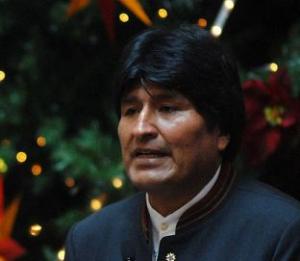Politics & Advocacy
Holding a coca leaf in his hand, Bolivian President Evo Morales Monday told a United Nations anti-drug meeting that Bolivians had the right to chew coca leaves, saying coca was not cocaine and that its use by Bolivians was an ancient tradition.

Bolivian President Evo Morales (wikimedia.org)
"We are very much aware of the damage that can be done by cocaine and we are working against drug trafficking... but we want the recognition of these ancestral rights," Morales said.
Morales was speaking at the annual meeting of the Commission on Narcotic Drugs in Vienna. Bolivia has taken issue with coca's inclusion in the 1961 UN Single Convention on Narcotic Drugs. Last year, it announced it was withdrawing from the treaty over the issue, and on January 1, Bolivia rejoined, but with the reservation that it recognized coca chewing.
Whether Bolivia will gain support from enough other countries to do that remains unclear. Under the treaty, the other countries that are signatories have one year to consider Bolivia's reservation. Unless one-third of them -- 62 countries -- object, the reservation "shall be deemed to be permitted."
In remarks reported by Reuters, Yury Fedotov, head of the UN Office on Crime and Drugs (UNODC), told a news conference in Vienna there was substantial opposition to Bolivia's move.
"We know that some countries already conveyed to us their strong opposition," he said, adding that he feared allowing Bolivia to make an exception for coca could cause "a domino effect."
Fedotov's fellow countryman, Victor Ivanov, head of the Russian Federal Drug Control Service, also spoke against the Bolivian move, saying "[w]e need to do everything we can against legalizing drugs."
Bolivia is the world's third largest coca and cocaine producer, behind Peru and Colombia. The Morales government has been trying to promote coca-based industries, with everything from coca tea and chewing gum to coca bread, while at the same time it is cooperating internationally with efforts to suppress the cocaine trade.
Bolivians have chewed coca leaves for thousands of years. Its mild stimulant effects take the edge off hunger and mitigate altitude sickness, and Bolivia is adamant that its traditional uses be recognized and the plant removed from the Single Convention.
This work by StoptheDrugWar.org is licensed under Creative Commons Attribution-ShareAlike 4.0 International
Comments
Where's the Problem?
If enough other countries object and Bolivia is not allowed to rejoin the treaty, then Bolivia is free to pursue any drug policy they want. If they are allowed back in, then a precedent is set that opens the door for other exceptions, like medical marijuana. It's win-win.
Add new comment